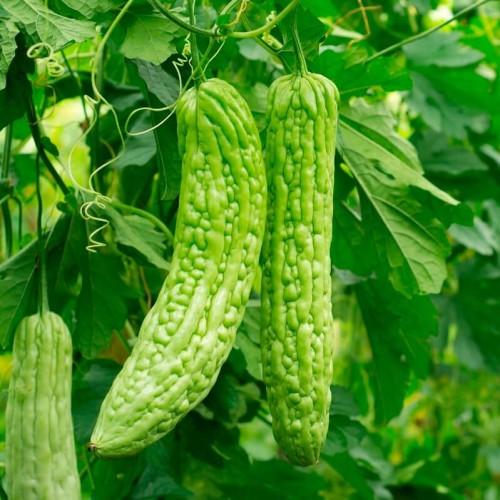
Available Options
Discover the perfect addition to your home garden with our Green Bitter Melon seeds. Cultivate vibrant, antioxidant-rich bitter melons that offer a unique and refreshing touch to your culinary creations.
Appearance:
Bitter melon, also known as bitter gourd or karela, is a vine-like plant with green, oblong-shaped fruits that have a bumpy, uneven surface. The flesh of the fruit is white and contains numerous small seeds.
Growing Conditions:
Bitter melon is a warm-season crop that requires a long, hot growing season to produce fruit. It prefers full sun and well-drained soil with a pH between 5.5 and 6.7. The seeds can be planted directly in the ground once the soil temperature reaches at least 70°F (21°C).
Germination Day:
Bitter melon seeds typically germinate in 10 to 14 days.
Harvesting:
Bitter melon is typically harvested when the fruits are green and still firm. They can be harvested when they are smaller and less bitter or allowed to fully mature and become more bitter. The fruits are typically harvested by cutting them from the vine with a sharp knife.
Nutrition:
Bitter melon is low in calories but high in fiber, vitamins, and minerals. It is a good source of vitamin C, folate, and potassium, and also contains small amounts of other vitamins and minerals.
Common use:
Bitter melon is a common ingredient in Asian, Indian, and African cuisines, where it is used in a variety of dishes such as stir-fries, soups, and curries. It can also be juiced or used in teas and supplements for its potential health benefits.
Health benefits:
Bitter melon has been used for centuries in traditional medicine to treat a variety of ailments, and recent research suggests that it may have potential health benefits such as improving blood sugar control in people with diabetes, reducing inflammation, and potentially even inhibiting the growth of cancer cells. However, more research is needed to fully understand its health benefits and potential side effects.
Thank you for visiting our home garden:
- Fanpage: fb.com/athenagarden.org
- Instagram: instagram.com/athenagardenorg
- Website: athenagarden.org












-190x190w.jpg)








